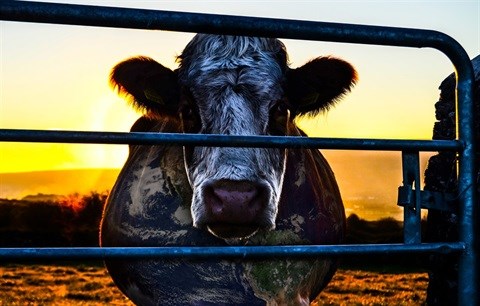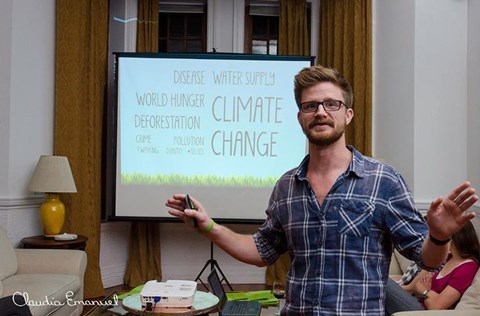
Top stories




ESG & Sustainability#BudgetSpeech2026: SRD grant unchanged, other Sassa social grants see hike
5 hours


More news











ESG & Sustainability
South Africa’s carbon tax should stay: climate scientists explain why










I attended the sold out Cowspiracy screening at the Labia a few weeks ago and was shocked to learn that the number one cause for most environmental issues: deforestation, greenhouse gases, CO2 emissions and water depletion is due to our global hunger for all things meaty, cheesy and creamy.

Here are a couple of facts to put things in perspective:
You can read more at www.cowspiracy.com/facts
These statistics are shocking to say the least, but what is even more shocking is the mass ignorance of the general public and blatant disregard to address these issues by most of those in the know. As discovered by Kip during the filming of Cowspiracy, most green companies, such as Greenpeace and Oceana, whose job it is to champion global environmental issues, wilfully ignore the number one cause of environmental destruction. I mean, why focus on causes like recycling and the cut down of transportation emissions if the main culprit of environmental damage is left unchecked? Why does no one want to talk about the 'cow' in the room?
Well the main problem is the agriculture industry makes money, a lot of money - and with money comes power and big players. Even Al Gore was hesitant to include facts about the impact of the agriculture industry in his ground-breaking documentary: An Inconvenient Truth, a documentary that ironically spurred Kip on his eco warrior crusade. And, in fact, Kip himself nearly didn't complete Cowspiracy due to its controversial nature and fear of what those big players could do.
Luckily he did and, hopefully, many more eyes will be opened to this issue. During the screening I was seriously considering how I could turn vegan overnight, contemplating saying goodbye to those juicy steaks and wondering where on Earth I could find vegan yogurt. Okay, so it's been more than a week and I'm still very much an omnivore, but I'm far more conscious of what I am buying and eating, and hope to make the shift to nearly full-time vegan sometime in the not-too-distance future.
It's hard, though, and that really is another reason why this issue it ignored; we're a species raised on meat and dairy and it's difficult to tell people to break lifelong eating habits - especially when you consider religious and cultural factors. However, the crux of the matter is that the way we currently produce and eat food is just not sustainable. If we want to live in a world with enough fresh water, clean air, abundant sea life and free-roaming animals we have to change the way we consume, otherwise our gift-giving Earth, which provides so much, will just not be able to anymore.
To get a more South African perspective I emailed Brett Thompson, National Programme Manager of Meat Free Mondays South Africa and Digital Marketing Manager of vegetarian food company Fry's a few questions.
I am the National Programme Manager of Meat Free Mondays South Africa. My organisation has provided the funding to bring Cowspiracy to South Africa. Together with While You Were Sleeping we have been active in promoting the movie in all media platforms across the country. I have also attended several screenings to date to facilitate Q&A sessions after the screenings.
To get people to question what they think living sustainably means. To plant a seed that what you eat has the biggest impact on the planet, not which car you drive. To make every South African aware that if they choose to eat more plant-based foods, they will be part of the change that will make this planet habitable for future generations to come.
The main objective of the Meat Free Mondays campaign is awareness. We aim to spread awareness that your food choices make a massive impact. Every day you have the opportunity to be an agent for positive change on this planet, not only one opportunity, but three! Every meal you choose to eat plant-based foods instead of animal products, you are part of the change that will end animal cruelty, mitigate global depletion of resources and improve your health. It starts with you and it's that simple.

Cowspiracy mainly focuses on the US agriculture industry and global environmental statistics. However, to say that we are different in South Africa is naive. Nearly all livestock in the US is factory farmed, while in South Africa, the number of animals raised in intensive conditions falls somewhere between 80% and 90%. South Africa is not immune to the issues associated with raising over 1 billion animals in factory farms for slaughter every single year. Each year the methane from the burps of 2.8 million cows is going into our atmosphere; the untreated waste of 2.6 million pigs is poisoning our water sources and superbugs are being created because 60% of all antibiotics are put into livestock feed.
Yes. In the future we won't have any choice but to eat a fully plant-based diet. It is just not possible to keep the rate of resource depletion going at present levels. Currently, 30% of the Earth's usable land is dedicated to livestock. Keeping in mind the 70 billion animals slaughtered each year end up on only about 3 billion people's plates. Outside of The West, the diet is mainly plant based. However, China, Brazil and India are starting to increase their consumption of meat. Vaclav Smil, author of Feeding the World, estimated that if everyone ate a Western diet, we would need 67% more land - now imagine if all those animals were free range! We just don't have enough planet.The future will see the growth of organic farms and small holdings, which will provide fruit and vegetables to a society whose diet is mostly plant based. I am not an idealist, I am realist!
It starts with you taking one day at a time. Firstly, start off with Meat Free Mondays, it is fun and easy. Then choose not to eat any factory farmed animal products. Once you are on your way, make sure you choose locally grown produce that is organic. Then move on to eating more whole foods such as grains, legumes, fruit and vegetables and swapping out chicken and fish. Finally, drop the beef, egg and diary. The only sustainable food industry is plant based and it starts with you.
I follow a plant-based diet, which has its challenges in South Africa, but it is possible. There is a growing trend towards veganism in South Africa because of the benefits to health, animal welfare and the environment. The more people choose to eat vegan, the easier it will become. So help me out, eat a vegan meal this week!
...................................................................................................................................................................................................
Changing a lifetime's habit of eating is hard but not impossible. Join Meat Free Mondays, starting with one day of no meat a week and go from there, be conscious of how much meat and dairy you consume; eat more fruit, vegetable and legumes. Together we can save the world one vegan at a time!